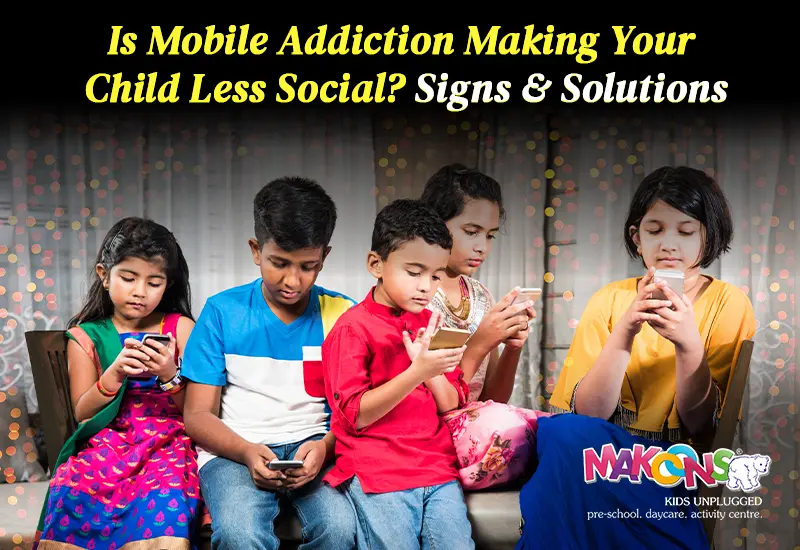Smartphones are a part of our lives in this era, without any doubt. We use them to stay connected as well as to learn something new. They have amazing advantages, but all this connectivity casts a long shadow, particularly over our children. Are those amazing screens unwittingly drawing them away from the real world and lessening their sociability? It’s a concern that many parents have, and we must discuss it with open hearts and clear minds.so let’s dive into this blog and learn about various effects and solutions of Stop child phone addiction.
The Growing Issues Regarding Child Mobile Phone Addiction
Do you remember when playground games and bike rides defined childhood?The reality today is so much more different. Two-year-old are swiping before they’re speaking in sentences. Elementary school students have many of their own devices, and middle school brings social life ever more to digital environments and less to real-time interactions.
This change isn’t merely a change of times – it’s a change of brains. It warns us that too much screen time can reprogram young developing minds, threatening to influence anything from attention span to social skill. When children spend hours using social media or playing unnecessary video games on phones, they lack the confidence and find it hard to have actual face-to-face social skills.The effects of screen time on kids reach well beyond mere wasted time.
Unveiling the Signs of Mobile Addiction in Kids
How do you know if your child’s phone use has gone too far? Watch for these signs of mobile addiction in children:
- Withdrawal Symptoms:Does your child become fidgety, worried, or irritable when their phone is taken away or they cannot use it? This is a sign of reliance.
- Loss of Interest: Has the youngster lost interest in past favorite pastimes including outdoor play, reading, or family games?
- Neglecting Responsibilities: Is phone use interfering with chores, homework, or even basic hygienic practices?
- Social Isolation: Are they choosing the virtual environment instead of interacting personally with friends and relatives? One significant consequence of mobile use on a child’s social skills
- Physical Symptoms: Too much screen time could also be related with headaches, eye strain, or sleep difficulties.
The Impact of addiction of Mobile Use on Your Child’s Social Skills
The consequences of screen use among children reach well beyond mere wasted time. As children replace screen interaction with in-person social interaction, they sacrifice important chances to build:
- Empathy and emotional intelligence: Facial recognition, understanding tone of voice, and how to appropriately react to the feelings of others are skills gained from in-person contact.
- Conversational skills: The give and take of actual conversation are far removed from text communication via emojis and shorthand.
- Conflict resolution: Resolving disagreements face-to-face requires patience, compromise, and control of emotions that cannot be learned through online communication.
- Body language understanding: Non-verbal communication constitutes a large percentage of communication—something that is completely lacking in online communication.
- Attention and listening skills: The immediacy of mobile apps does not promote the patience required to listen attentively.
Guiding Them Back to: How to Reduce Screen Time for Children (Solutions for Mobile Addiction)
The bad news is, it’s never too early to get your kid into a healthier habit. Here are some fixes for mobile addiction:
- Lead by Example: Kids tend to do as they see.Observe your own phone usage.
- Establish Clear Boundaries:Clearly state when and how long phones may be used, enforcing rigorous and consistent guidelines. Create phone-free zones (like the dinner table) and periods (such bedtime).
- Encourage Offline Activities: Help your youngster identify or re-search non-screen-based interests and activities include sports, arts and crafts, reading, or instrument playing.
- Prioritize Family Time: Give family time top priority and schedule frequent events including the whole family like board game evenings, outdoor excursions, or simply casual conversation.
- Create chances for social interaction: Encourage friend playdates, team sports participation, club and organization membership, or other pursuits.
- Open Communication: Talk to your child in a way they can grasp the requirement of balance and the possible bad consequences of too much screen usage. Hear them, then work together to develop answers.
- Use Parental Controls: Most cell phones and apps offer tools that let you monitor and limit screen usage. Investigate these choices.
- Be Patient and Consistent: Breaking entrenched habits requires time and effort. Be patient with your child and consistent in the boundaries you establish.
Conclusion
In the end, it’s not to eradicate screens completely but to keep them from crowding out the fullness of experience. By using simple techniques to cut children’s screen time and appreciating the impact of mobile use on their social lives, we can help them negotiate the virtual realm while boosting their social ties and general welfare. Let’s help our kids to glance up from the screen and experience the pure delight of human connection: the friend’s laughter, the warmth of a smile, and the warmth of actual contact.
Also Read Our Blog –Top 5 Super foods for kids Digestion That Improve Health


